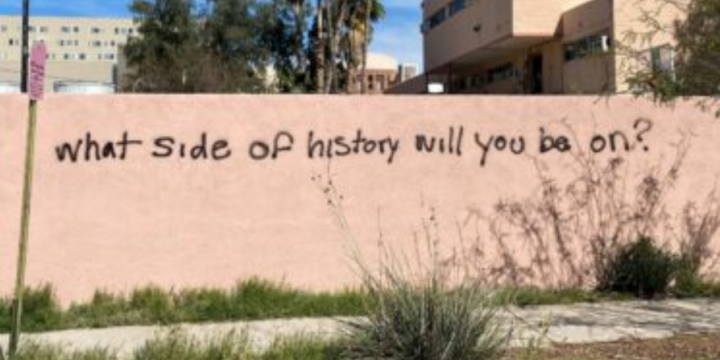Following vandalism at their University of Arizona chapter house, Alpha Epsilon Pi (AEPi), the largest Jewish fraternity in the US, remains steadfast against campus antisemitism.
By Dion J. Pierre, Algemeiner
The national office of Alpha Epsilon Pi (AEPi), the largest college Jewish fraternity in the US, has condemned recent vandalism of the house of one of its chapters at the University of Arizona, expressing resolve in the face of rising antisemitism across the country.
On Sunday, someone graffitied “What side of history will you be on?” on the perimeter wall of the AEPi house, an apparent allusion to the Israeli-Palestinian conflict amid the ongoing war between Israel and Hamas in Gaza.
“Once again, an AEPi house has been vandalized with antisemitic graffiti in a transparent attempt to intimidate Jewish students,” AEPi chief executive officer Rob Derdiger said in a statement on Monday. “Administrators at the University of Arizona — and on campuses throughout North America — must commit to protecting its Jewish students by holding those groups responsible for these actions accountable by removing their recognition and expelling students from school who violate the university’s code of conduct.”
Antisemitism targeting AEPi at the University of Arizona is not new, according to numerous reports by local media. In 2014, a rival fraternity, Sigma Alpha Epsilon, broke into their house and proceeded to assault several AEPi members while shouting antisemitic epithets, according to school officials.
In recent months, two professors have been suspended for allegedly defending Hamas’ massacre of Israeli civilians on Oct. 7 and, as reported by the Arizona Jewish Post, Jewish students have been spit on during vigils commemorating Israelis whom Hamas murdered.
In Monday’s statement, Derdiger said “AEPi will not be intimidated,” adding, “We will continue to work to advocate — lawfully and peacefully — for Israel.”
Founded at New York University in 1913, Alpha Epsilon Pi is the largest Jewish fraternity in the world, with over 150 chapters spread across four countries and 100,000 alumni. Every year, its chapters hold “Walks to Remember,” a march around campus that commemorates victims of the Holocaust. Last May, the national office named a new deputy director in Andrew Feuerstein, who will lead the organization’s efforts to raise funds and sustain relationships with alumni.
Incidents at other universities in Arizona have drawn the attention of state lawmakers, who voted in February to grant Jewish students the right to withhold student fees from groups, such as Students for Justice in Palestine (SJP), that allegedly promote antisemitism. Just weeks after Oct. 7, Arizona State University’s (ASU) SJP chapter broke school rules to help bring Rep. Rashida Tlaib (D-MI) to campus. At the time, the lawmaker had been widely criticized for uttering a wave of virulent comments attacking the Jewish state, including those in which she accused Israel of genocide and erroneously blamed the Jewish state for a rocket that exploded near Al Ahli hospital in Gaza.
The event would not have been the first time that ASU’s SJP chapter hosted a public figure accused of antisemitism. In 2021, it invited Mohammed El-Kurd to address students, using about $10,000 in student government funding to pay for the event. The Palestinian writer has trafficked in antisemitic tropes, demonized Zionism, and falsely accused Israelis of eating the organs of Palestinians, according to the Anti-Defamation League (ADL).
As The Algemeiner has previously reported, AEPi chapters have been targets of antisemitic hate crimes across the country, including several eggings of their off-campus houses at Rutgers University. Last August, the fraternity announced that it was teaming up with the ADL to launch the AEPi Antisemitism Response Center, a “centralized system for reporting and tracking antisemitic incidents on campuses.”
